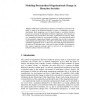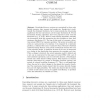524 search results - page 26 / 105 » Artificial Organisms That Sleep |
120
click to vote
TSP
2010
14 years 8 months ago
2010
We consider the problem of distributed channel estimation in a sensor network which employs a random sleep strategy to conserve energy. If the N network nodes are randomly placed a...
CEC
2007
IEEE
15 years 8 months ago
2007
IEEE
— It is often believed that biological organisms have an inherent tolerance to environmental changes. This is a seductive concept if transferred to artificial organisms. An expe...
132
click to vote
ECAL
2007
Springer
15 years 8 months ago
2007
Springer
Multi-agent organizations in dynamic environments, need to have the ability to adapt to environmental changes to ensure a continuation of proper functioning. Such adaptations can b...
140
click to vote
DIS
2006
Springer
15 years 3 months ago
2006
Springer
Knowledge discovery systems are constrained by three main limited resources: time, memory and sample size. Sample size is traditionally the dominant limitation, but in many present...
134
click to vote
BIOWIRE
2007
Springer
15 years 6 months ago
2007
Springer
Desynchronization is a novel primitive for sensor networks: it implies that nodes perfectly interleave periodic events to occur in a round-robin schedule. This primitive can be us...


